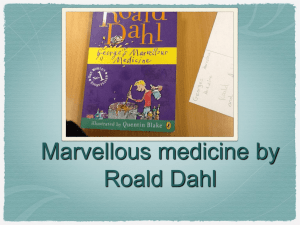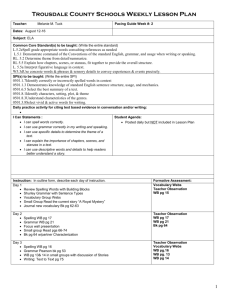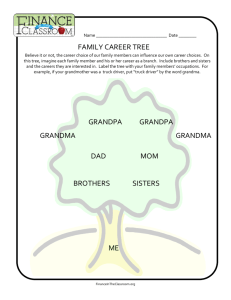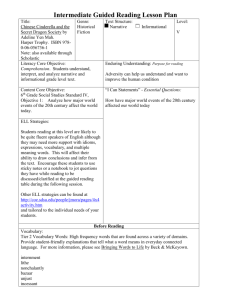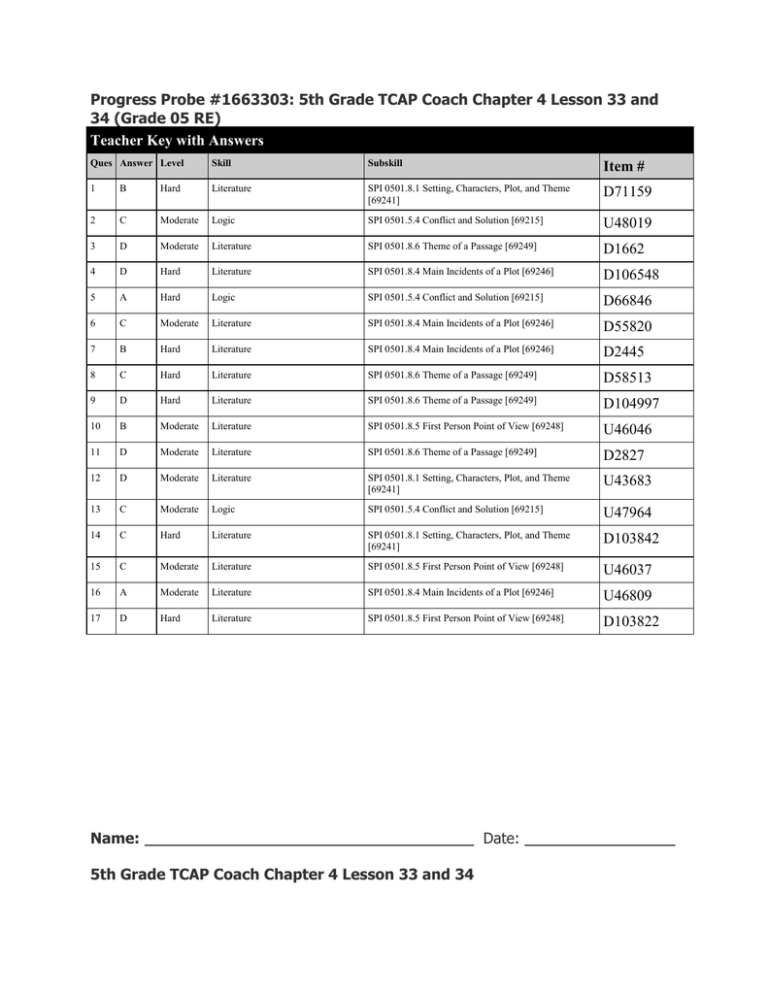
Progress Probe #1663303: 5th Grade TCAP Coach Chapter 4 Lesson 33 and
34 (Grade 05 RE)
Teacher Key with Answers
Ques Answer Level
Skill
Subskill
Item #
1
B
Hard
Literature
SPI 0501.8.1 Setting, Characters, Plot, and Theme
[69241]
D71159
2
C
Moderate
Logic
SPI 0501.5.4 Conflict and Solution [69215]
U48019
3
D
Moderate
Literature
SPI 0501.8.6 Theme of a Passage [69249]
D1662
4
D
Hard
Literature
SPI 0501.8.4 Main Incidents of a Plot [69246]
D106548
5
A
Hard
Logic
SPI 0501.5.4 Conflict and Solution [69215]
D66846
6
C
Moderate
Literature
SPI 0501.8.4 Main Incidents of a Plot [69246]
D55820
7
B
Hard
Literature
SPI 0501.8.4 Main Incidents of a Plot [69246]
D2445
8
C
Hard
Literature
SPI 0501.8.6 Theme of a Passage [69249]
D58513
9
D
Hard
Literature
SPI 0501.8.6 Theme of a Passage [69249]
D104997
10
B
Moderate
Literature
SPI 0501.8.5 First Person Point of View [69248]
U46046
11
D
Moderate
Literature
SPI 0501.8.6 Theme of a Passage [69249]
D2827
12
D
Moderate
Literature
SPI 0501.8.1 Setting, Characters, Plot, and Theme
[69241]
U43683
13
C
Moderate
Logic
SPI 0501.5.4 Conflict and Solution [69215]
U47964
14
C
Hard
Literature
SPI 0501.8.1 Setting, Characters, Plot, and Theme
[69241]
D103842
15
C
Moderate
Literature
SPI 0501.8.5 First Person Point of View [69248]
U46037
16
A
Moderate
Literature
SPI 0501.8.4 Main Incidents of a Plot [69246]
U46809
17
D
Hard
Literature
SPI 0501.8.5 First Person Point of View [69248]
D103822
Name:
5th Grade TCAP Coach Chapter 4 Lesson 33 and 34
Date:
Question 1 of 17
Read the following passage from Mark Twain's, "The Notorious Jumping Frog of Calaveras
County."
Smiley was mighty proud of his frog, and well he might be, for fellers that had traveled and
been everywheres all said he laid over any frog that ever they see.
Well, Smiley kep' the beast in a little box, and he used to fetch him downtown sometimes and
lay for a bet. One day a feller—a stranger in the camp, he was—come acrost him with his box,
and says:
"What might it be that you've got in the box?"
And Smiley says, sorter indifferent-like, "It might be a parrot, or it might be a robin. Maybe, but
it ain't—it's only just a frog."
And the feller took it, and looked at it careful. Then he turned it round this way and that, and
says, "H'm—so 'tis. Well, what's he good for?"
"Well," Smiley says, easy and careless, "he's good enough for one thing. I should judge—he can
outjump any frog in Calaveras County."
The feller took the box again, and took another long, particular look. Then he give it back to
Smiley, and says, very deliberate, "Well," he says, "I don't see no p'ints about that frog that's
any better'n any other frog."
"Maybe you don't," Smiley says. "Maybe you understand frogs and maybe you don't understand
'em. Maybe you've had experience, and maybe you ain't only a amateur, as it were. Anyways,
I've got my opinion, and I'll resk forty dollars that he can outjump any frog in Calaveras
County."
Why does Smiley seem "indifferent-like" in showing the man his frog?
A. Smiley doesn't want the man to steal his frog.
B.
Smiley is teasing the man into wanting to know more.
C.
Smiley thinks the man might make fun of his frog.
D.
Smiley is trying to teach the man about frogs.
Question 2 of 17
Hidden Treasure
1 As soon as I opened the door, I sensed something mysterious. I stood in front of the stairs
leading up to the attic of Grandma's old house. I could see particles of floating dust in the
narrow ray of light shining down the steep stairway from above. 'It's only an attic,' I told myself,
but the butterflies in my stomach didn't listen.
2 Grandma had asked me to find her old sewing box. She hadn't sewn anything in years, but she
wanted to mend an old quilt her mother had made for her when Grandma was my age. The box
was somewhere in the nooks and crannies of her cobweb-draped attic.
3 As I slowly climbed the attic stairs, I felt a musty breeze touch my face. A tiny, broken
window allowed a sliver of light to cut through the darkness, illuminating a string hanging from
a single light bulb mounted on the low ceiling. When I pulled the cord, a dull, yellow light
revealed the jumbled contents of the attic.
4 'Ah!' I jumped nervously as I found myself in front of a headless mannequin wearing an old,
dusty cloak. Just beyond the headless dress dummy were several large boxes, each carefully
taped and labeled. On top of the boxes was an assortment of old objects. On the other side of
the stairs, an orderly row of dusty black suitcases with old-fashioned leather straps and metal
buckles waited for the next time they would be of use. Behind these, barely visible in the dark
recess formed by the sloped ceiling, was a large trunk. It was very dusty and obviously old.
5 As soon as I saw the trunk, my mind filled with images of forgotten treasures secreted away
by someone long ago. I wanted to find Grandma's sewing box, but even more I wanted to open
that trunk and discover what was hidden inside. Quickly walking over to it, I dropped to my
knees on the wooden floorboards and gripped the front edge of the rounded lid. I pushed with
all my might, but it didn't budge. Leaning back on my heels, I squinted in the dim light,
searching for what prevented me from opening my treasure chest. On the front of the chest, a
metal plate with a rusty keyhole in its center held the lid tightly to the base.
6 My wave of disappointment was interrupted by my grandmother's faint voice floating up the
stairs from the floor below. 'Is everything OK?'
7 'Just looking for your sewing box, Grandma,' I shouted back.
8 Looking around quickly, I spotted Grandma's sewing box among the clutter. Casting a quick
glance over my shoulder at the locked trunk, I climbed down the stairs, leaving the attic and its
undiscovered treasures behind.
9 'I'm so happy that you were able to find it,' Grandma said, taking the box from my hands.
'That attic is so cluttered, I was afraid my sewing box would be lost forever. I hope it wasn't too
much of a bother,' she said, looking up from sorting through the contents of the box to give me
an apologetic glance.
10 'Not at all, Grandma,' I said, smiling slightly. Then I told her about the trunk and asked if she
knew what was in it. Sensing my anticipation, Grandma closed her sewing box and looked at
me thoughtfully.
11 'That trunk sounds interesting,' she said, her eyes shining with curiosity. 'Why don't we
investigate? I have some old keys down in the kitchen, and I have long since forgotten what
they open.'
12 In a cluttered drawer in the kitchen, we discovered a very large key, like the kind that were
made when locks were a new invention. I grabbed it and eagerly rushed back up the stairs.
13 I inserted the key into the rusty lock and turned. Nothing happened. Another wave of
disappointment welled up inside me, but I was determined to open that trunk. I tried again, this
time pushing the key all the way in and holding the lock while turning it. To my surprise, it
opened with a groan.
14 A cloud of dust and stale-smelling air escaped from the trunk. The single light cast my own
shadow over the trunk so that the contents were barely visible. Quickly rummaging through the
contents, I discovered that the trunk contained nothing but old clothes.
15 My search was interrupted by Grandma's voice floating up from below. 'Did the key work?'
she called.
16 Quickly I gathered an armload of the contents and carried them down to show Grandma.
17 In the kitchen, we began laying the clothes out on the table. Grandma was smiling. 'I forgot
about all this,' she said. 'These are my father's army uniforms. Look, his name is sewn across his
right-hand pocket.' Then she picked up a wooden box and held it close to her heart.
18 'These are his medals,' she said, setting the box down on the table. 'He received several
medals for bravery.' Grandma arranged the medals on the uniform that was draped across the
table. There was a photograph of several soldiers standing together with their left hands at their
hips and their right hands in a crisp salute at the camera. Tears had formed in Grandma's eyes.
19 'My father is the one on the left,' she explained. She beamed as she gazed at the image of her
father.
20 As Grandma's stories about her father and the wonderful things he did began to unravel, I
came to realize I really had discovered a treasure. It was much more than a trunk of old clothes.
It was a treasure worth far more than anything I could have imagined.
What is the climax of the story?
A. The narrator brings the sewing box down from the attic.
B.
Grandma tells the narrator stories about her father.
C.
The narrator opens the trunk and finds old clothes.
D.
Grandma helps the narrator find an old key.
Question 3 of 17
Long ago, when George Washington was just a boy, his father gave him a hatchet. George
loved the gift and wanted to try it out right away. He went into the yard and looked around for
some way to test his new hatchet.
In the yard was a little cherry tree. This was a special tree that George's father had planted, and
he was very proud of it. Without thinking, George sank the blade of his hatchet into the little
tree's trunk. He chopped the cherry tree down.
When he saw that his cherry tree had been destroyed, George's father was upset. Young George
was sorry, too, and realized the harm he had done. However, he did not try to hide his actions.
He simply told his father the plain truth. "I cannot tell a lie, Father," said George. "I did it."
George's father was unhappy about his little cherry tree. Still, he was quite pleased with his son
for telling the truth. He knew that sometimes telling a lie is easier than being truthful, and he
was proud that George was an honest boy. He hoped that George would also become an honest
man.
What is the theme of the story?
A. George knew that he would grow up to be a great leader.
B.
Safety is important when handling a hatchet.
C.
Great people always do great things.
D.
Telling the truth may be hard, but it is right.
Question 4 of 17
Read the stories.
"WHY SHOULD there always be this fear and slaughter between us?" said the Wolves to the
Sheep. "Those evil-disposed Dogs have much to answer for. They always bark whenever we
approach you and attack us before we have done any harm. If you would only dismiss them
from your heels, there might soon be treaties of peace and reconciliation between us." The
Sheep, poor silly creatures, were easily beguiled and dismissed the Dogs, whereupon the
Wolves destroyed the unguarded flock at their own pleasure.
ONCE UPON A TIME a Wolf resolved to disguise his appearance in order to secure food more
easily. Encased in the skin of a sheep, he pastured with the flock deceiving the shepherd by his
costume. In the evening he was shut up by the shepherd in the fold; the gate was closed, and the
entrance made thoroughly secure. But the shepherd, returning to the fold during the night to
obtain meat for the next day, mistakenly caught up the Wolf instead of a sheep, and killed him
instantly. Harm seek. harm find.
A WOLF, meeting a big well-fed Mastiff with a wooden collar about his neck asked him who it
was that fed him so well and yet compelled him to drag that heavy log about wherever he went.
"The master," he replied. Then said the Wolf: "May no friend of mine ever be in such a plight;
for the weight of this chain is enough to spoil the appetite.
After reading the first two stories, how do the sheep seem to come across to the reader?
A. smart
B.
happy
C.
hungry
D.
dumb
Question 5 of 17
from Little Women
Jo and Meg arrived, feeling a little shy, for they seldom when to parties. Even though this little
gathering was quite informal, it was an event to them. Mrs. Gardiner, a kind old lady, greeted
them warmly and handed them over to the eldest of her six daughters.
Meg knew Sallie and was at ease very soon, but Jo, who didn't care much for girls or girlish
gossip, stood about with her back carefully against the wall, and felt as much of out place as a
colt in a flower garden. No one came to talk to her, and one by one the group dwindled away till
she was left alone.
She could not roam about and amuse herself, so she stared at people rather glumly till the
dancing began. Meg was asked to dance at once and gracefully floated about the room. Jo saw a
big red-headed boy coming toward her, and she slipped behind the curtain into another room.
"Dear me, I didn't know anyone was here!" stammered Jo as she came face to face with the
'Laurence boy'. She started to head back through the curtain.
The boy laughed and, though he looked a little startled, said, "Don't mind me, stay if you like."
"Won't I disturb you?"
"Not a bit. I only came here because I don't know many people and felt rather strange at first,
you know."
"So did I. Don't go away, please, unless you'd rather."
The boy sat down again and looked at his shoes till Jo said, trying to be polite, "I think I've seen
you before. You live near us, don't you?"
"Next door, actually," he said and they both laughed easily.
What was the main conflict in this story?
A. Jo felt uncomfortable at the party.
B.
Meg and Sallie talked badly about Jo.
C.
The Laurence boy made fun of Jo.
D.
Jo left the party unhappy and crying.
Question 6 of 17
You have been assigned an expository essay on the hibernation stages of the Tennessee black
bear. Which of the following would not provide a supporting detail for your topic?
A. the physical side effects of hibernation
B.
the time of year hibernation occurs
C.
what the black bears like to eat when they wake up
D.
the possibility that a black bear can wake up during the winter
Question 7 of 17
Long ago, an army was preparing for battle against an enemy. The enemy army had a fierce
monster fighting on its side. He was taller and stronger than any other man, and every soldier
feared him. He was very ugly but also very smart.
As the armies lined up on the battlefield, the monster walked out from the enemy line and
yelled, "Don't fight!" He offered to settle the battle by fighting the other side's best soldier. The
battle would go to the side of whoever won the one-on-one fight.
Who would be brave enough to fight the monster, though? The soldiers were all afraid. Finally,
a poor orphan boy stepped forward and offered to fight the monster. The soldiers looked at him
in disbelief. However, the orphan boy was unafraid. He had been taking care of himself for a
long time by using a rope to catch wild pigs to sell. He knew he could use his rope to cause the
big monster to fall. The king agreed to let him try.
The armies stood on each side as the monster carried his spear, sword, and shield onto the field.
The orphan boy carried nothing but his rope, but he was so eager to meet the monster that he
ran out onto the battlefield. Before the giant could get ready, the boy roped his legs and made
him fall. Then the orphan boy quickly tied him up. The battle was over, and the orphan boy was
a hero.
The steps in the plot are as follows:
1. The fight takes place.
2. A boy volunteers to fight the monster.
3.A monster wants to fight the other side's best soldier.
4.Two armies are about to fight.
Which choice puts the steps in the correct order?
A. 4,2,3,1
B.
4,3,2,1
C.
4,1,3,2
D.
3,2,4,1
Question 8 of 17
Dear Helpful Hannah,
Jesse and I have been best friends since kindergarten. We live across the street from each other
and spend all our free time together. We help each other with homework, watch movies, and
hang out. We really love to be outdoors tossing a football, riding four-wheelers, or hunting deer.
I even have my own chair at Jesse's family's dinner table.
Lately, though, things have been changing. Jesse hasn't been coming around as much. When I
stop by to visit, he seems busy or preoccupied. I think a lot of it has to do with his family. I
don't really know why, but something makes me feel weird when I go in his house. Everyone is
tense, on edge. I want to help, but I don't know how. Should I ask Jesse what's going on, or
should I just ignore the situation? Should I leave him alone, or should I try to spend time with
him to get his mind off things? I need your advice.
Signed,
Worried Friend
Dear Worried:
It's okay to ask Jesse what's going on, but if he doesn't want to talk about it, don't pry. Just let
him know that you are there for him if he ever wants to talk about it. Then keep visiting and
asking him to do things with you. Be supportive and understanding. Don't take it personally if
he declines your offers. He's obviously dealing with some difficult things.
Signed,
Helpful Hannah
What is the implied theme of this letter?
A. Jesse and his friend play outdoors.
B.
Hannah and Jesse are friends.
C.
Jesse's friend is worried about him.
D.
Jesse and his friend are having dinner.
Question 9 of 17
Volleyball is an enjoyable sport that promotes teamwork. It can be played indoors or outdoors
and requires only a volleyball, net, and players. For those interested in learning how to play
volleyball, this essay is for you.
Volleyball consists of two teams with six players on each team. Each team stands on opposing
sides of a net, which is positioned in the center of a marked off rectangle. The net should be
hung 2.5 meters high, between two poles.Three of a team's players stand at the front of the net
and three at the back. Both teams face the net.
Volleyball is played to 25 points. The team in the lead must win by 2 points. One point is
scored when a team wins a rally. A rally happens every time the ball is served. If a team reaches
25, but is only winning by 1 point, play will continue until one of the teams wins by 2 points.
Here is how to win a rally, or score a point. A team can score if the opposing side fails to return
the served ball. A score can also be made if the opposing team hits the ball out of bounds.
Finally, a point can be scored if the opposing team hits the ball more than three times or allows
the ball to hit the ground.
Other rules to keep in mind while playing volleyball are, first, each team can only hit the ball a
maximum of three times. Second, the same player CANNOT hit the ball consecutively. Lastly,
the ball must be hit with the player's hands, wrists, or forearms.
Volleyball is a team sport and requires that players work together to keep the ball in the air and
return it over the net. It is an enjoyable sport that does not require any necessary skill or training
to play. People of all ages can enjoy playing volleyball. Hopefully this essay has taught you the
basics about how to play volleyball and sparked your interest so that you'll go out and try.
What can be implied from the information given in the fifth paragraph of the expository above?
A. If these rules are broken, the other team gets the ball.
B.
If these rules are broken, the other team automatically wins.
C.
If these rules are broken, a new game has to be started.
D.
If these rules are broken, the other team gets the point.
Question 10 of 17
How can the reader tell that this poem is written using the first person point of view?
A. The speaker says the moths are 'like tiny planes.'
B. The speaker uses the words “I” and “my.”
C. The speaker explains why light attracts moths.
D. The speaker describes how the town looks in the dark.
Question 11 of 17
Which of the following is not a common theme across many stories?
A. Good deeds are rewarded, while evil deeds are punished.
B. Justice will always be served, even if it does not happen right away.
C. In the end, hard work always pays off.
D. Luck is the most important character trait a person can have.
Question 12 of 17
The First Walk on the Moon
1 It was the night of July 20, 1969. All across America, people were doing the same thing. They
were gathered in front of their television sets. They were waiting to witness an unforgettable
moment in history. This was the night that, for the first time, a human being would set foot on
the moon. It was a goal scientists had worked for many years to accomplish.
2 Greg Mitchell was amazed by space. Grandpa called him the family space expert. Astronauts
Neil Armstrong and Buzz Aldrin were going to walk on the moon tonight, and Greg couldn't
wait. It was all he had thought about ever since Apollo 11 launched into space.
3 He was sitting in the family room with his mom, sister, brother, and grandpa. The newscaster
announced that the moonwalk had been moved up several hours. The Mitchell family cheered.
It wouldn't be long now.
4 There was just one problem. Greg's beloved dog, Bessie, who meant so much to him, was
about to have puppies. Greg's dad came in from the barn. 'Greg,' Dad said, 'I know how much
you want to see that moonwalk. But Bessie's your dog, and she's about to have those pups.'
5 'Aw, Dad,' Greg protested, 'I can't miss this!'
6 'Now, Greg,' Dad said, 'You know that you're responsible for Bessie. Not only that, she needs
you. Put on your shoes, and I'll meet you out there.'
7 Deep down, Greg knew his dad was right. Bessie was his dog, and he loved her a lot. She
would feel better having Greg there. He glanced up at the moon as he hurried out to the barn.
'Please, Mr. Armstrong and Mr. Aldrin,' he wished, 'please wait until the puppies are born.
Don't start without me.'
8 He sat next to Bessie on the blanket. She liked having her head petted. Soon, Bessie had four
healthy puppies. They were so cute. Greg was glad he hadn't missed it.
9 'Son,' his dad offered, 'you go see how those astronauts are doing. I'll finish up here.'
10 Greg got back in time to see Neil Armstrong climb slowly down the ladder of the spaceship.
He held his breath in amazement as Armstrong announced with wonder, 'That's one small step
for man, one giant leap for mankind.' Buzz Aldrin joined Armstrong a few minutes later. The
two men placed an American flag on the moon's surface.
11 It was a night Greg would never forget. Not only had he witnessed history in the making, but
also there were four new additions to the family. He had no trouble figuring out what to name
the puppies. Neil, Buzz, Armstrong, and Aldrin had not only very special names but a very
special birthday too.
Which statement best describes a lesson found in 'The First Walk on the Moon'?
A. Some events are so important that we remember them forever.
B.
An interesting lesson about life can be found in 'The First Walk on the Moon.'
C.
Families and scientists watched two astronauts set foot on the moon on July 20,
1969.
D.
Being responsible sometimes means putting the needs of others before your
own wishes.
Question 13 of 17
Reflections of the Heart
1 Patty Sorrenson stood on a step stool in her kitchen. As she shined a light along the top of the
high wooden cabinets, her husband, Jim, called out, 'Patty, what are you doing?'
2 'Goodness, Jim!' Patty exclaimed. 'You scared the living daylights out of me.'
3 'Well, what were you doing?' Jim pressed.
4 'I am cleaning the tops of these cabinets. They're filthy,' she explained.
5 'You wouldn't be looking for the ruby, would you?' her husband jokingly inquired.
6 'I would not,' Patty retorted sharply, but her face reddened with guilt. She was ashamed that
she wanted so badly to find the ruby necklace supposedly hidden in the house.
7 The necklace had been a present to Patty's aunt, Margaret, when Margaret was a young girl. A
friend of Aunt Margaret's father had given her the beautiful ruby necklace when she was nine
years old. Margaret's father, feeling this was too valuable a gift for a young girl, said that he
would hide the necklace until Margaret was older. At 16 years of age, Margaret asked her father
for the necklace, but he told her he would give her the ruby when she married. However,
Margaret never married, and the location of the necklace was lost after her father died. The only
clue was something Margaret's father had written on a piece of paper tucked away in his
dresser: 'Reflections of the heart lead to treasures.' Over the years, many family members had
searched the little house for the ruby unsuccessfully. Margaret herself eventually lost interest in
the ruby and declared that whoever could find the ruby would become its owner.
8 When Aunt Margaret, now 104 years old, moved out of the little house and traveled to live
with a relative in another state, Patty and her family moved in. Patty loved living in the little
house with its reminders of long ago. She especially prized a beautiful oak table made by her
great-grandfather, a cedar wardrobe, a beautiful heart-shaped mirror, and a lovely oil painting of
Aunt Margaret's mother. When anyone asked, she always maintained that she loved the little
house for itself and never thought about the treasure it might be hiding.
9 Patty climbed down from the step stool and tossed the cleaning rag to her husband. 'Here,' she
said. 'I'm going to help Heidi in the dining room.' Patty left the room before her laughing
husband could say another word.
10 Heidi, Patty's 13-year-old daughter, was polishing furniture in the dining room. Patty greeted
her and walked over to the oak table to sit in one of the chairs and rest for a moment.
11 'Reflections of the heart lead to treasures,' Heidi recited as she dropped into a chair beside
her mother. 'The reflection of that mirror tells how badly I need a hot shower!'
12 'Reflections of the heart,' her mother repeated. 'Heidi, the mirror is a heart! The heart
reflects!' Patty said, jumping up from her chair. She walked over and stood directly in front of
the mirror, then stepped aside and looked at the reflection there. The mirror reflected the oak
table. Patty spun around and walked over to the table. She ran her hands across the tabletop.
There were no seams in the tabletop. It was made of one solid piece of oak. She looked under
the table and down the legs. They were all solid. Carefully, she and Heidi turned the table over.
There were no drawers or recessed areas. A central crosspiece, held in place with a large
wooden peg, braced the four legs.
13 'Heidi,' she asked, 'could you run and get me some pliers?' Heidi ran excitedly and got the
pliers for her mother.
14 Patty used the pliers to carefully pull out the wooden peg holding the crosspiece. Behind the
peg was a deep hole. Patty tipped the table up a bit, and out of the hole popped the long-lost
ruby necklace. There the treasure was—in the reflection of the heart—where it had been hiding
for more than 90 years.
What is the climax of the story?
A. Heidi says she needs a shower.
B.
Aunt Margaret moves out of her house.
C.
Patty finds the ruby necklace.
D.
Jim asks his wife what she is doing.
Question 14 of 17
Courage
The word courage brings to mind daring people who are willing to take big risks. I think of
astronauts who are willing to explore the unknown and firefighters who are willing to storm
burning buildings just to save other people. Courage, to me, has always been reserved for that
elite group of people who stare fear down and do the impossible, like our soldiers. But not too
long ago I found out that we all can be courageous, even in small ways.
It all started when a new girl named Sunai, who was from Japan, enrolled in my fifth grade
class. She was very shy and, as my classmates and I soon found out, spoke very little English.
Our teacher encouraged us to welcome her, but instead many of the students shunned her
because she dressed and spoke so differently. The food that Sunai brought for lunch looked
strange, and she ate with sticks. At recess no one would play with her and she seemed sad.
About two weeks later my friend Amy blurted out, "I think we should go play with Sunai. It is
not right that she is being left out."
I was relieved that my friend was feeling the same way I was about Sunai, but also scared
because I didn't know how to approach her. I was also afraid my classmates would make fun of
me if I tried to hang out with her. After a little hesitation on both our parts, Amy and I slowly
walked over to where Sunai was drawing with chalk on the sidewalk. At first we started
drawing along side of her and then exchanged friendly smiles. Before long we were able to
make hand gestures and drawings on the sidewalk to communicate. We were laughing and
having a fun time playing. The three of us became good friends and after all the other students
saw how much fun we had playing, they started to get to know Sunai too.
I am so glad that my friend Amy and I had the courage to approach Sunai at recess that day. If
we hadn't, Sunai probably would have had a very, lonely fifth grade year, and Amy and I would
not have made a new friend. Amy was so brave for speaking up about the way Sunai was being
treated, and we both showed courage by reaching out to a new person. In the end, we were all
winners.
Why was the author of this story reluctant to approach Sunai when her friend Amy said that
they needed to?
A. The author did not like Japanese people and Sunai was Japanese.
B.
The author was afraid Sunai would not like her and tell her to go away.
C.
The author was afraid the other students would make fun of her.
D.
The author was shy and did not like to approach new people.
Question 15 of 17
How can the reader tell this poem is written using the first person point of view?
A. The speaker describes the different sounds heard at the zoo.
B. The speaker explains why a visit to the zoo can be interesting.
C. The speaker describes his or her own visit to the zoo.
D. The speaker points out which animals can be found at the zoo.
Question 16 of 17
Pulling for a Miracle
1 Robert was just rolling his bike out of the garage when the sound of his mother's voice startled
him. Dropping the bike, he trotted toward the back door.
2 'Yes, Mother?'
3 'I made some cookies,' his mother smiled.
4 Robert pulled off his jacket and hung it on the peg. The bike ride could wait. Once he was
inside, his mother surveyed his appearance. She followed with the usual, 'Why don't you go
clean up first?'
5 He grinned as he washed his face and hands. So far the only downside to this day was a
slightly sore throat. It had been bothering him since he woke up this morning. He was sure it was
nothing that a few of his mom's cookies couldn't fix.
6 At the kitchen table, Robert's mother placed a glass of milk in front of him and smoothed his
hair. Her hand lingered on his forehead for a moment. Robert recognized her concerned-mother
look, so he pulled away. 'Just let me feel your forehead. You feel warm.'
7 'Ah, Mom,' Robert protested. This was not the way he'd planned to spend his day—being
treated by his mother for some ailment. 'I feel fine!'
8 'You have a fever,' she insisted. 'You're going to need rest and liquids until further notice.'
9 Robert flipped on the radio and got settled on the sofa. Gloomily, he stared out the window at
the beautiful day. He hoped he could regain his freedom after the next check of his forehead.
Suddenly, his thoughts were drawn to the radio as an important news story was announced.
10 'News update for February 2, 1925. This just in: Sled drivers and their dogs continue to battle
winter weather while trying to bring medicine for the children of Nome, Alaska. Doctors are
treating a diphtheria outbreak. They are waiting for delivery of the medicine needed to fight the
disease. It must be transported from Anchorage, Alaska, nearly 1000 miles away from Nome. Icy
weather conditions make it unsafe for planes to fly the entire distance. Sled dog teams have been
relaying the medicine in this rescue mission.
11 'Winds strong enough to knock over sleds and drivers have been making travel for the dog
teams risky. Weather updates from Alaska tell us winds are blowing at 80 miles per hour.
Temperatures are 36 degrees below zero. Many are afraid the teams will fail to make it through.
We will continue to keep our audience posted about this astounding rescue attempt. We now
return you to our regular program.'
12 A song began playing, and Robert's attention again drifted to the window. 'Thirty-six below
zero,' Robert wondered aloud. 'How will they ever make it?'
13 A while later, Robert's mother declared his fever gone, and he no longer needed to stay inside.
When he didn't jump up and head outdoors, she was concerned. 'Are you sure you are feeling all
right, Robert?'
14 'Yes, but I think I'll stay and listen for another news update.' He told her the story he'd heard
about the rescue mission in progress. 'Do you think they can do it, Mom?' he asked.
15 'Anything is possible, son. You just have to hope for the best.'
16 All afternoon Robert listened and waited. Finally, after the sun had set and dinner dishes were
cleared, Robert's mother ordered him to turn off the radio. 'There will be more news tomorrow,'
she said.
17 The next morning, Robert searched the newspaper for news about the mission. They had
made it to Nome! As he read the story, he imagined the lead sled dog, Balto, pulling through the
last leg of the journey. The achievement became even more admirable when he learned that
Balto had led his team through a blinding blizzard. The sled dog relay allowed Gunnar Kasson,
the driver of Balto's team, to successfully deliver the medicine. Many had worked together to
save the lives of Nome's citizens.
18 Robert did some quick figuring in his head. 'Wow!' he thought. 'They beat impossible odds to
cover 53 miles in just 20 hours!' Relieved and excited about the news, Robert gobbled down his
breakfast and headed outdoors. He wanted to be sure to get something done in his next 24 hours
before heading back to school.
Why is paragraph 17 important in this selection?
A.
It tells how the sled dog teams succeeded.
B.
It tells who the sled dog team's driver was.
C.
It tells how far the sled dog teams traveled.
D.
It tells why the sled dog teams were needed.
Question 17 of 17
If an author writes a story that includes a cast of multiple characters and subplots, and the
author does not stick to any one character in particular when telling the story, what literary
point of view is the author writing from?
A. first person
B.
second person
C.
third person
D.
third person omniscient
Copyright © Discovery Education Assessment 2012. Proprietary Information. All rights reserved.
Discovery Education Page

